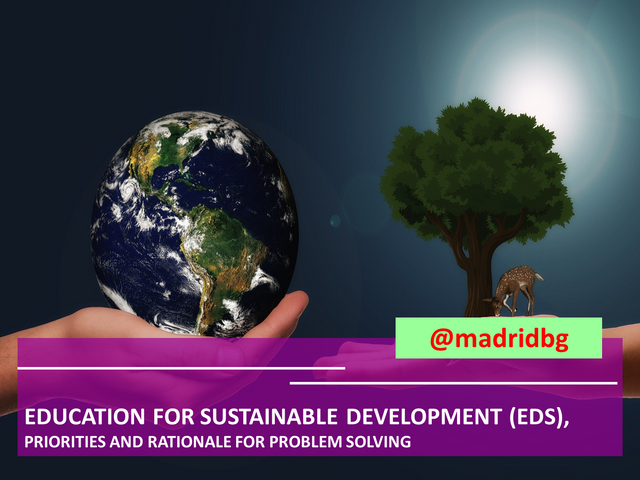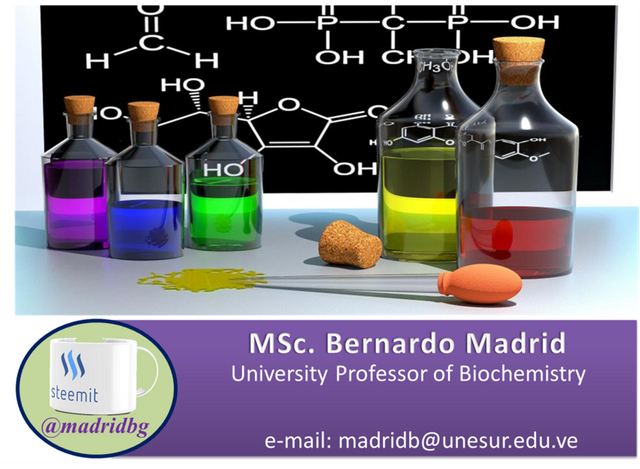
Author: @madridbg, through Power Point 2010, using public domain images. Gerd Altmann
Greetings and welcome dear readers to another installment associated with the components of a quality education, oriented to the formation of environmentally conscious citizens and sustainable development.
As has been constant in my publications, we will share this type of material through the #Projecthope community, which promotes true citizen training from the #Steemit platform.
In this sense, we will start with the thematic addressing some postulates assumed in 1992 at the Agenda 21 conference developed by the UN. In this conference specifically in chapter 36, 4 lines or levels of fundamental supports are assumed that had to be improved facing the year 2021.
Therefore, we will make a review of these axes and associate them with an Education oriented to Sustainable Development.
PRIORITIES FOR SUSTAINABLE DEVELOPMENT EDUCATION

1. IMPROVEMENT OF BASIC EDUCATION
It is assumed as the first priority of ESD, which is fundamental to advance towards sustainability in the political, economic and environmental spheres, based on the idea of education for all, which is the guarantor of the development of countries.
However, even in the 21st century and almost 30 years after Agenda 21, there are still international differences in the opportunities that societies have to access educational institutions, where it is evident that some countries only have basic school periods between eight and twelve years of age.
This scenario is a limitation for Education for Sustainable Development, where it is necessary to have an equal education for all with clear goals and visions of the future oriented towards sustainability, supported by activities that promote public participation (global and local), awareness, change of unsustainable behaviors and reinforcement of values.

Fig. 2. Equality in education levels is a necessity to achieve substantial changes. Author: Ian Ingalula
Ultimately, basic education must be reoriented and expanded to address sustainability, to include critical thinking skills, skills to organize and interpret information and data, ability to formulate questions, and the ability to analyze problems facing communities.
2. REORIENT EXISTING EDUCATIONAL PROGRAMS
It is the second priority of ESD, where it is expressed that it is not enough with the quantity of education, but with an education that is coherent and adequate to the principles of sustainability. Reorientation must occur at all levels, from basic education to university, since the future leaders of the countries acquire their professional training at higher levels.
The re-orientation of programs should focus on including more principles, skills, values and sustainability perspectives with the initial purpose of contributing to the creation of prosperous, just, caring and respectful societies. Therefore, it is necessary to review existing curricula, in terms of their objectives and contents, in order to develop a transdisciplinary perspective of the social, cultural, economic and environmental dimensions.

Fig. 3. Educational programs must ensure environmental protection. Author: Jamie Johannsen
According to the Decade of Education for Sustainable Development for the period 2005-2014 (UNESCO, 2006), an education reoriented to the principles of Sustainable Development promotes:
1. Interdisciplinarity and holistic learning rather than learning by separate subjects.
2. Value-based learning.
3. Critical thinking as a counterpart to memorization.
4. Pluri-methodological approaches: texts, art, theater, debates, among others.
5. Participatory decision-making.
6. Information applicable to the local reality, rather than to broader areas.
3. KNOWLEDGE AND PUBLIC AWARENESS PÚBLICA
This priority is conceived recognizing that ESD goes beyond schools and addresses the population at large. Progress toward sustainability requires that growing global sensitivity to social, economic, cultural, and environmental problems be transformed into an understanding of their causes and that local, national, and global perspectives of the true meaning of living and working sustainably be developed.
A more sustainable society requires widespread community education and responsible media dedicated to stimulating an active and informed population of resource management decisions and programs, which would help the goals of these programs; otherwise, their success will be compromised in the face of an uninformed public.
4. TRAINING
Last but not least is the process of training, often associated with education, which is a process of social transformation that provides individuals with the knowledge, skills, perspectives and values necessary to participate and intervene in their well-being. Specifically, the term training primarily involves informing individuals about accepted practices and procedures, supporting them in acquiring and/or refining skills to perform specific tasks.

Fig. 4. Training allows individual or collective approach to problems. Author: Gerd Altmann
In Education for Sustainable Development it is necessary for private or public organizations to train their leaders and workers in environmental management, so that they can use inputs safely and efficiently and thus abide by environmental regulations for the welfare of societies.
FINAL CONSIDERATIONS

Undoubtedly the environmental issue has presented a growing interest, whose dissemination process has been massified due to the different social media we have nowadays, in addition to the clear signs of affections that our planet has been presenting. In this sense, we must achieve real changes in our style of education and train conscientious citizens who work towards a true Sustainable Development.
Citizens capable of acting individually and collectively in solving problems from the local component with possible projections at the global level in order to improve the balance systems of our planet.
CONSULTED BIBLIOGRAPHICAL REFERENCES

[1] María José Vásquez Vargas. Education for Sustainable Development (ESD). A positioning of young progressives in Central America.. Article: Online Access
[2] J. GUTIÉRREZ, J. BENAYAS, S. CALVO. EDUCATION FOR SUSTAINABLE DEVELOPMENT: ASSESSMENT OF CHALLENGES AND OPPORTUNITIES OF THE DECADE 2005-2014. IBEROAMERICAN JOURNAL OF EDUCATION. No. 40 (2006), pp. 25-69. Article: Online Access
OF INTEREST

•

Grateful with the community @project.hope and with all the management team of the same one that they motivate us to continue working in a mutual and balanced growth.


@tipu curate
Downvoting a post can decrease pending rewards and make it less visible. Common reasons:
Submit
Upvoted 👌 (Mana: 0/6) Get profit votes with @tipU :)
Downvoting a post can decrease pending rewards and make it less visible. Common reasons:
Submit
Education is a base to bring development and much more innovation. Its something that everyone should've to develop their life as well as in society and country. nice post
Downvoting a post can decrease pending rewards and make it less visible. Common reasons:
Submit
Thanks for your contribution @alokkumar121, we must develop a new generation trained to act and deal with the different scenarios that we face at the environmental level, so that we are aware of the damage and the solutions that we can provide, thanks for stopping by and leaving your comment.
Downvoting a post can decrease pending rewards and make it less visible. Common reasons:
Submit